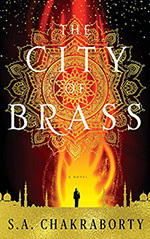
![]() Arifel
Arifel
2/21/2018
![]()
City of Brass has been on my reading list since I saw the cover and blurb among a list of 2017 releases - gorgeous looking book with historical Middle Eastern influences? Sounds great! Alas, I did not get quite the experience I wanted from it, although some aspects are very good indeed.
The book primarily follows Nahri, a young woman working as a con artist on the streets of 18th century Cairo. Confusingly, despite having demonstrable magic healing and language powers, Nahri initially does not believe in magic, instead focusing on the more material things in life (like survival on the streets of 18th century Cairo). What finally makes this belief system unsustainable is her accidental summoning of a very attractive Daeva, or djinn, who promptly saves her from some marauding ghouls and whisks her away. She agrees to follow him on a trip to Daevabad, the titular City of Brass and home of the djinn, a journey which neither of them particularly want to take, but which Dara (the aforementioned attractive Daeva) says will be safest for someone of Nahri's very special bloodline - because, of course, she is not a human but a shafit, part-djinn, and from an extinct royal line at that. Interspersed with Dara and Nahri's journey, and blending with their narrative partway through, is the story of Ali, the younger son of Daevabad's ruler, who is funding shafit rebels within the city to help improve their position.
Despite explicitly saying on the back cover that this is adult fantasy, I've seen City of Brass lumped in with YA numerous times (including on the Locus Recommended Reading List), and there's certainly a few recognisable beats from YA fantasy - a love triangle, a "mundane" heroine who discovers she is actually the Special, and a vaguely unpleasant setting with a highly regimented and easy-to-learn caste system all make an appearance. With that said, this book is much richer than that summary would suggest, and I felt the worldbuilding was extremely detailed - and, I hope, well researched - and interesting, and certainly big enough to support more than this single story. It's also very well-written, in a style which demanded and rewarded concentration - Chakraborty certainly knows what she's doing.
So yes, I liked City of Brass, but I couldn't help feeling that its content was always slightly too far from what I wanted it to do - I wanted more early character work and clearer motivation, especially for Nahri; and less of the intricate, racially-delineated political scheming - much of which I found hard to concentrate on or care about without the links to character motivation being clearly spelled out. The pacing also felt a little off, and I couldn't help but feel that the second half of the book, where Nahri and Dara have arrived in Daevabad and are negotiating court politics, could have done with much more room to breathe. The second half of the book also laid bare just how little reason either of them had to go to Daevabad, a city now run by rivals of both Nahri and Dara's clan, and who consider the latter to be an irredeemable war criminal. Neither character had anything to do when they got there besides "be safe", except that they clearly aren't safe. This constant meandering - which also happens to a lesser extent with Ali, who doesn't seem to have a strong motivation to help the shafit, particularly when his own safety is on the line - makes it much harder to care about the situations the characters end up in, because the whole time you're reminding yourself they don't even have a reason to be there.
I'll be watching how the sequels in this series pan out, and whether some of my concerns seem to be addressed in later books - there's certainly enough exciting elements here that I'd love to see this series work out. For now, though, I'd recommend this mostly to people who want to experience a fascinating, intricate fantasy world, rather than those hoping for a particularly compelling plot.
https://adrijoyreads.wordpress.com/2018/02/21/city-of-brass-by-s-a-chakraborty/